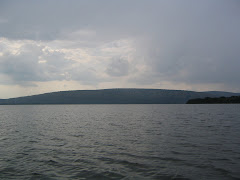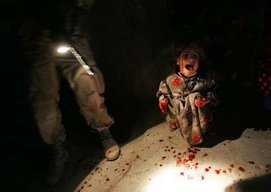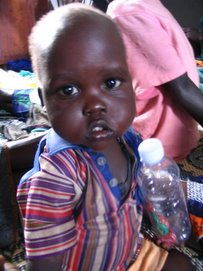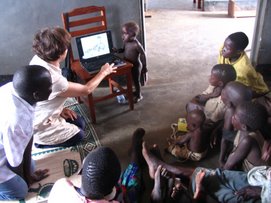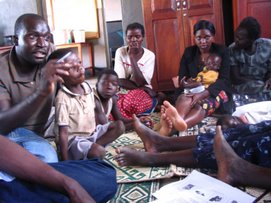

Listen to my pictures
 Milton Obote, Uganda's first Prime Minister walks across the tarmac at Entebbe to meet the Duchess of Kent
Milton Obote, Uganda's first Prime Minister walks across the tarmac at Entebbe to meet the Duchess of Kent The above pictures were ripped from: http://www.mccrow.org.uk/EastAfrica/Uganda/UgandaIndependence/IndependenceUganda.htm
The above pictures were ripped from: http://www.mccrow.org.uk/EastAfrica/Uganda/UgandaIndependence/IndependenceUganda.htm
" At the turning-point in the history of Uganda, I hope that all our friends will join with me in bestowing upon the new, independent Uganda our prayers and hopes for peace, prosperity and a growing strength in her now role in international affairs. Uganda has many friends, both within her borders and outside. With the goodwill of all who wish to see her prosper, Uganda will go forward from strength to strength.
Let us pause for a moment and look back along the path we have traveled. In the days before this part of the African continent was known to the western world, we became known as a group of peoples who welcomed the traveler, the missionary and the explorer. As the years passed, we reaped the benefit of this friendly nature of ours. The technical progress of the last half-century has transformed our country in countless ways. But, fortunately, we have continued to keep our own customs and culture. It is up to us now, more than ever, in shaping our new country, to achieve a consolidation, in which neither the rapid progress of recent years, nor the age-old customs of our forefathers, are lost or diminished, but rather fused into a new national characteristic in which the best is preserved, while the worst may be thrown away.
AN UHURU MESSAGE FROM THE PREMIER
from the Uganda Argus
National unity
What other aims have we, today, on looking forward? One of our first needs must be national unity. The narrow ambitions of a tribe, a sect, or a party must be subordinated to the greater needs of one complete Uganda. In our Government of these past months, we have striven to put the interests of Uganda before all else, and we shall continue to do so. But on attaining independence, this Government has new responsibilities to bear, heavier than those which any previous government in Uganda has borne, and we are conscious of the care and statesmanship with which we must move in taking our first steps in foreign affairs. In the Commonwealth and in the United Nations we shall be among friendly states, both from other parts of Africa and from elsewhere. But the regard in which a nation is held in the eyes of the world depends upon the successful operation of a complex machinery.
The Prime Minister of Uganda, The Hon. A. Milton Obote, M.N.A.
On 9th October, 1962, Uganda becomes an independent sovereign state within the Commonwealth of Nations. H.M. the Queen becomes Queen of Uganda and the Head of State, represented in Uganda by a Governor-General.
The Hon. Apollo Milton Obote becomes its first Prime Minister.
Her Majesty is to be represented at the celebrations by H.R.H. the Duke of Kent and the Duchess of Kent who will afterwards make a tour of the Regions.
from the Uganda Independence Souvenir Programme.
We have paid attention to the design of that machinery. First, we require political stability. My Government will seek to maintain that stability, by the strict maintenance of law and order, by retaining the confidence of the voters, and by upholding the freedom of the individual. Secondly, we require to safeguard the economy. This we will do by diversifying and improving our agriculture, providing incentives to industry, and creating conditions which encourage foreign investment. Thirdly, we will press forward with social services within realistic bounds and not as dictated by idealism. Fourthly, we need an efficient civil service to operate the Government. Uganda is well provided with well-qualified African officers and we shall continue to ensure that these are attracted into government service by the offer of the right terms, so that a balanced Africanisation programme shall continue.
I conclude by emphasising that there is a place in the Uganda of today for all who have her interests at heart, whatever their tribe, race or creed. Let all of us, who wish to see Uganda prosper, join together today in resolving to build a great and united nation."

Omera Otunnu, I read with excitement the Daily Monitor report, “Otunnu starts familiarisation tour today”, published on August 24, indicating that you were ‘expected to meet supporters in Jinja, Tororo and Mbale before proceeding to northern and western Uganda’.
The last time, 29 years ago, when another Omera, Dr Milton Obote, landed in Bushenyi, his supporters, family and relatives said they were welcoming him back from his long trip to Singapore. Those who saw him close swore that he wept at this sight of semi-naked or rug-draped dancers who welcomed him.
May I also warmly welcome you back from your long peace talks with Yoweri Museveni, which took place in Nairobi in 1986? Like Obote did in July 1980, you will soon find out, if you have not already done so, that Uganda is a totally different country from the one you left 23 years ago. It is divided is four ways: by war, wealth, access to resources and law. Whereas the south and west have enjoyed peace and tranquillity, the north and east have been ravaged by war in which a million people may have lost their lives or are physically and psychologically maimed.
If, 23 years on, the damages of the five-year war are yet to be repaired, it is reasonable to conclude that it will take at least 100 years for the north and east to recover. Whereas about 5 per cent of Uganda’s 32m people are basking in wealth, living in houses that are comparable to the ones where you used to attend diplomatic receptions in Manhattan, New York, and enjoying the best lifestyle, education and medical services money can buy at home and abroad; the other 95 per cent are trapped in a dehumanising poverty, and dying at home for lack of medicine.
Whereas all Ugandans are entitled, as a right, to access the most lucrative government jobs in the army, police and the civil service, as well as business contracts; the majority are totally excluded.
From December 2005 to February 2006, during the last election campaigns, I personally organised a survey, which found that 1.75 million people from the north and east, holding university degrees and other professional qualifications, were unemployed.
And whereas there is one law that protects local and international criminals, such as the ones who invaded and looted the DRC; stole GAVI and Global Fund; murdered innocent Ugandans in corner Kilak, Atiak Acol Bur in Acholi and Mukura in Teso; there is another law, which criminalises the innocent.
It was under this two-tracked law that on November 14, 2005, Dr Kizza Besigye was arrested and charged with rape, terrorism and treason, the last one punishable by death. Five years on, the government has not produced a scintilla of any treasonable acts. In that time, several of his “comrades-in-terrorism” have died in detention.
And it is under the same two-tracked law that some 1.8 Bakiga communities living in Bunyoro are looking at the abyss. It is against these bleak realities that I must ask you what you have planned to do and achieve within next 18 month before Uganda holds the next general elections before March 2011.
To concentrate your mind on the time constrains before you, let me put this to you in a personal context. If you decide to reclaim the late Rev. Otunnu’s farm in Mucwini and start to prepare the plots to grow Gwana (cassava), Pull (groundnuts) Layata, (sweet potatoes), Malakwan, Kal (millet), none of these staple food items will have been ready to feed your campaign agents and prospective voters, should you decide to go to Parliament.
And, as a celebrated bachelor, should you decide to take an original bride, and have a baby, the only place to find one is in the Internally Displaced Persons (IDP) camps in Pabo, Kilak, Atiak and scores of other camps in Acholi, Lango and Teso sub-regions. Sadly, your child will be only nine months old in February 2011, too young to run any errand.
Just randomly pronounce the name “Acirocan” (I have endured poverty) in Acholi and Lango sub-regions, or “Acan” (poverty) in Teso; and literally thousands of prospective brides will surround you in no time!
If you asked for my advice on what to do in the next 18 months, I would strongly advise you to persuade the opposition to drastically scale down their list of demands for reforms to just one item: the Electoral Commission.
All other reforms would automatically fall in place once there is an independent Electoral Commission whose members have got not only the power to bar RDCs and other partisan government officials from acting as electoral officials from village to national levels; but also the courage of their conviction to tell the world, as Samuel Kivuitu, the former chairman of the Kenya Election Commission did, that he was ordered to change the presidential election figures.
I am quite certain that your incomparable legal mind and diplomatic skills have prepared you well enough to effectively contribute to free and fair elections in 2011.
Meanwhile, let us pray together as your beloved late father Rev. Otunnu would expect: “Oh God, please protect me against my friends in the opposition for I can avoid my enemies in the Movement!”


